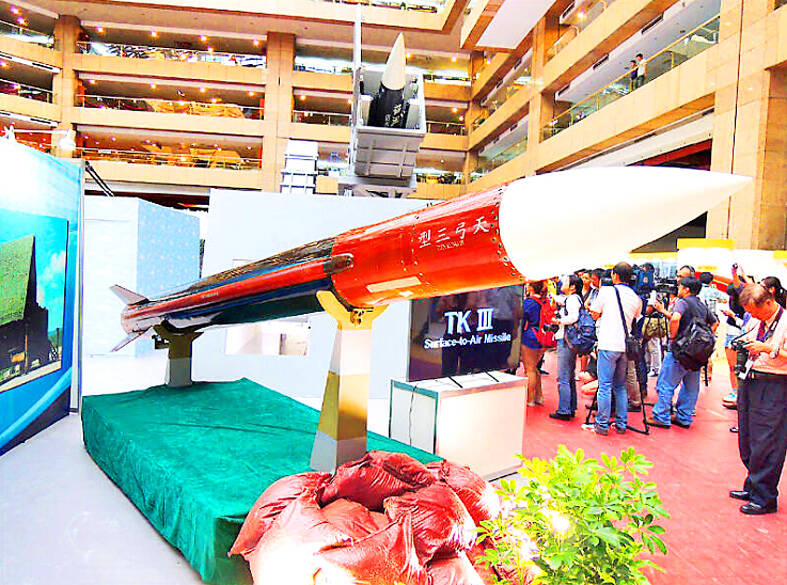Amendments to the National Security Act (國家安全法) that stiffen penalties for companies that supply products to the military using Chinese parts went into effect on Friday.
The amendments to articles 11 and 12 of the act aim to prevent defense contractors from providing the military with China-made goods using explicit bans and heavy fines, the Ministry of Justice said.
Under the updated Article 11, those who provide China-made goods or services to the military face one to seven years in prison and up to NT$30 million (US$953,137) in fines.

Photo: Lo Tien-pin, Taipei Times
Under changes to Article 12, people who falsify the provision of military arms, munitions or other materiel face three to 10 years in prison and fines of NT$5 million to NT$50 million.
Amendments to Article 18 also set the High Court as the court of first instance for charges related to fostering clandestine organizations, to leverage the national security experience and expertise of the court and the Taiwan High Prosecutors’ Office, the Ministry of Justice said.
The amendments specify that the High Court convene a specialized court to oversee such cases.
The ministry said the amendments were needed to address the sensitive and confidential manner of national security cases.
It said it has already discussed with the Taiwan High Prosecutor’s Office about training personnel and obtaining equipment needed to oversee cases focused on national security matters.
When necessary, the first and second appellate courts and the prosecutors under those courts would work in teams to broaden the judicial system’s ability to handle national security cases, it said.
To prevent foreign powers from funding political parties or candidates, as part of efforts to undermine the legitimacy of elections and erode the nation’s democratic systems, the ministry said it is prioritizing efforts to combat foreign election influence attempts.
New Taipei City’s Ciaotou District (橋頭) Prosecutors’ Office earlier this week uncovered alleged efforts by China’s Taiwan Affairs Office to influence voters in January’s election to support specific candidates by offering paid trips to China.
The justice ministry urged the public to beware of such attempts and to avoid them to prevent inadvertently contravening the law.

US President Donald Trump yesterday announced sweeping "reciprocal tariffs" on US trading partners, including a 32 percent tax on goods from Taiwan that is set to take effect on Wednesday. At a Rose Garden event, Trump declared a 10 percent baseline tax on imports from all countries, with the White House saying it would take effect on Saturday. Countries with larger trade surpluses with the US would face higher duties beginning on Wednesday, including Taiwan (32 percent), China (34 percent), Japan (24 percent), South Korea (25 percent), Vietnam (46 percent) and Thailand (36 percent). Canada and Mexico, the two largest US trading

AIR SUPPORT: The Ministry of National Defense thanked the US for the delivery, adding that it was an indicator of the White House’s commitment to the Taiwan Relations Act Deputy Minister of National Defense Po Horng-huei (柏鴻輝) and Representative to the US Alexander Yui on Friday attended a delivery ceremony for the first of Taiwan’s long-awaited 66 F-16C/D Block 70 jets at a Lockheed Martin Corp factory in Greenville, South Carolina. “We are so proud to be the global home of the F-16 and to support Taiwan’s air defense capabilities,” US Representative William Timmons wrote on X, alongside a photograph of Taiwanese and US officials at the event. The F-16C/D Block 70 jets Taiwan ordered have the same capabilities as aircraft that had been upgraded to F-16Vs. The batch of Lockheed Martin

GRIDLOCK: The National Fire Agency’s Special Search and Rescue team is on standby to travel to the countries to help out with the rescue effort A powerful earthquake rocked Myanmar and neighboring Thailand yesterday, killing at least three people in Bangkok and burying dozens when a high-rise building under construction collapsed. Footage shared on social media from Myanmar’s second-largest city showed widespread destruction, raising fears that many were trapped under the rubble or killed. The magnitude 7.7 earthquake, with an epicenter near Mandalay in Myanmar, struck at midday and was followed by a strong magnitude 6.4 aftershock. The extent of death, injury and destruction — especially in Myanmar, which is embroiled in a civil war and where information is tightly controlled at the best of times —

China's military today said it began joint army, navy and rocket force exercises around Taiwan to "serve as a stern warning and powerful deterrent against Taiwanese independence," calling President William Lai (賴清德) a "parasite." The exercises come after Lai called Beijing a "foreign hostile force" last month. More than 10 Chinese military ships approached close to Taiwan's 24 nautical mile (44.4km) contiguous zone this morning and Taiwan sent its own warships to respond, two senior Taiwanese officials said. Taiwan has not yet detected any live fire by the Chinese military so far, one of the officials said. The drills took place after US Secretary